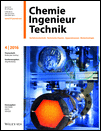Entwicklung und Anpassung einer Free-Flow-Elektrophorese zur selektiven quantitativen Trennung von Metallionen
Development and Adaptation of a Free Flow Electrophoresis for Selective and Quantitative Separation of Metal Ions
Abstract
deEffiziente Technologien im Metallrecycling werden immer bedeutsamer. Hierbei zeigt sich der Metallionentrennschritt als essentiell für den Aufbereitungsprozesses, da Metalle meist in komplexen Gemischen vorliegen. Eine Alternative zu etablierten Trennmethoden stellt die Free-Flow-Elektrophorese dar, deren Trennwirkung auf unterschiedlichem Wanderungsverhalten geladener Teilchen im elektrischen Feld beruht. Hierbei wurden sehr gute Trennergebnisse erzielt, die durch den Einsatz von Komplexbildnern auf eine Reinheit von bis zu 100 % gesteigert wurden. Untersucht wurden Gemische aus Fe, Cu, Dy und Yb.
Abstract
enRecycling of metals becomes more and more important. Within the recycling and beneficiation process the separation of metal ions is one of the most challenging process steps as high-tech metals are often existent in complex mixtures. Free flow electrophoresis using different mobility of ions in an electric field is a promising alternative to established separation processes. Very good results in separating metal ions could be obtained and even improved to a purity of up to 100 % by using complexing agents. The focus of this work was on mixtures of Fe, Cu, Dy and Yb.




